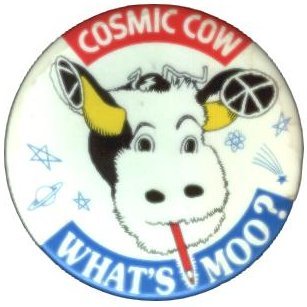
2019 June❮❮prevnext❯❯
2019.06.01
- See What I Mean (feat. Aiza Ntibarikure) (Beat Market) - music on "Tuca and Bertie"
- River Shiver (Pomplamoose) like the little rewindy sound
- The Big Noise From Winnetka (Haggart, Bauduc)
- Can't Take My Eyes Off of You (Lauryn Hill) Heard the original in a movie, found this version
- Jamirobeegees Mashup: Stayin' Alive / Virtual Insanity (Pomplamoose)
- Cielito Lindo (Pedro Infante) I remember singing a "ay yi yi yi / sad farmer's daughter / it's love you know makes a valentine grow / and not a pail of wa-ter" in elementary school.
- trust in lies (rick & craig ) This sounds like a commercial song as background music in "Brokeback Mountain" but I guess it was a studio group
- Everybody Talks (Neon Trees) A friend pointed to a cover of this but I like the original.
- Lonely Feelings (LOVE SUPREME) Some HBO background music
- Supersonic Rocket Ship (The Kinks) In the Avengers movie. I sort of hate that you probably wouldn't call a faster than light vehicle "supersonic"...
- Doom and Gloom (Jeff Bhasker Mix) (The Rolling Stones) More Avengers
- Dear Mr. Fantasy (Traffic) Avengers again
- Tobacco Road (Nashville Teens) Keillor wrote about the "Tobacco Road" as a cultural thing, this song is probably a parallel reference
- Listen Here (Dave Frishberg) Quirky song about our inner voice referenced in a Daniel Klein book
- Dueling Banjos (Eric Weissberg & Steve Mandell) Just wanted the classic.
- My Superstitious Brain (DJ Crazy J Rodriguez) Nice mashup
- Appletree (Erykah Badu) so stylish
- Also Sprach Zarathustra (Shawn Lee's Ping Pong Orchestra) "Opposite People" at Wake Up The Earth played a version of this "funked up 2001 theme"
- New Orleans Music (Rebirth Brass Band) Played this with Second Line Brass Band - there is a fear that local streetbands are kind of just Rebirth cover bands...
- Slow Motion (Juvenile) - cousing of one of the NOLA bands.
- Saw Lightning (Beck) - saw a tweet saying this wasn't very good, huh, but I like it, some neat sounds.
2019.06.02
Unrequited love is way underrated. It's kind of like smoking. Ultimately it's bad for you, especially in the long term. Both are bad for your health, make you "smell" worse to others, and cause you to pick up annoying repetitive habits, whether it's constantly wanting something in your mouth (smoking) or anxiously checking e-mail (unrequited love). But on the other hand, both have a certain glamour, give us something to do with ourselves, and have a huge deserved mystique and romantic history behind them. Smoking gets you outside where as otherwise you might stick yourself in the office all day, unrequited love gets you to write amusing bon mots where as otherwise you might write nothing but pedestrian e-mail.
spring 2019 one second everyday

I don't remember who gave me the idea, but I'm SO much happier now that I'm framing my task manager in terms of what benefit I'll get from doing things rather than having an endless list of tasks I "need" to do.
2019.06.03
This is the real world, muchachos, and you are in it.Somehow the line has stuck with me but without the "muchachos"
Sometimes I wonder if the Mayans were right and that this quote is less true after December 2012 or so.
If you ever get a chance to work in mysterious ways I highly recommend it because you can get away with ANYTHING.
I really do appreciate how Trump's new hairstyle is doubling down on "Future Biff from Back to the Future 2"

Speaking of the Trump and the UK, I wonder if Boris Johnson was an inspiration? The whole "lets have a wacky bad blond hair situation that distracts people from what god-awful idiots we are"
2019.06.04
What seems to have changed in our psyches was a great catastrophic event--probably related to climate change--that decimated our ranks about 135,000 years ago. At that time, the entire population of the subspecies that we now call human plummeted to just six hundred.Man that is a crazy scary number!
The creative adult is the child who has survived.Le Guin resents the misattribution and considers the sentiment vapid, which kind of bums me out because I like it, for sometimes all too obvious reasons.
2019.06.05
One other line from "Fear of Flying" has stuck in my head, and that's Adrian saying "Courage is the first principle" as he cajoles Isadora into running away with him. [...] I think he might be citing Aristotle, actually, the quote sometimes given as "Courage is the first of human qualities because it is the quality which guarantees the others."This idea has been stuck in my mind today, and I was reading some summaries of the Aristotelian roots.
I have friends and loved ones afflicted with industrial grade anxiety, and it's so hard for them to deal with. And so often I have my own troubles with courage, this fear of proving less capable than I need myself to be resulting in a lack of productivity and a plethora of avoidance behaviors.
Some of the difficulty comes from the way we use emotions to think with. I'm not sure if it's even physically possible to spur ourselves into any action without some level of emotional energy - but we overdo it. It's so, so hard to find that space between "this doesn't matter, nothing matters, who cares" and "this is so important, if it doesn't go well things will be just awful - awful!"
My best suggestion is to try to encourage the stance of "Everything matters, but nothing matters that much".
(I acknowledge there's the "first world" vibe to this problem, privilege involved in having a place in the world that seems fundamentally comfortable and stable - but I also know every person tends to have a hedonistic setpoint, that people from a really wide variety of circumstances end up able to adapt and end up with a similar level of subjective contentment whatever their external circumstance.)
"We here at Weyland-Yutani Corporation would like to wish a happy Pride Month to all of our LGBT colonists on LV-426."

via
While looking up the design, I found this site: https://speculativeidentities.com/ - lovely deep dives into the typography and logo design of future companies.
I think most "time management problems" are really emotion management problems.
2019.06.06
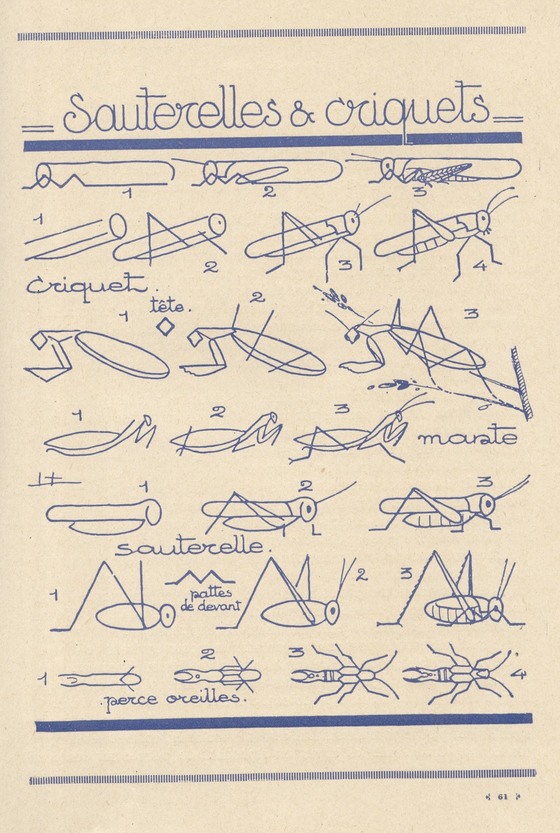
(via kottke)
It's interesting comparing Ed Emberley's stuff - Emberley is aimed a bit younger, or at least simpler, and showing kids (and timid grownups) that they have the basic skills they need to make basic cartoon-y stuff. Lambry's title ("Animals As They Are") gives a hint as to its ambitions - it reminds me of the studio drawing class I took, where I learned about starting with the most basics of line and curve and building around that.
And I guess I'll plug my Ed Emberley tribute animals.alienbill.com - 25 drawings that fly in from their component shapes and squiggles and become interactive puppets.
2019.06.07
I was at a fight when a hockey game broke out. In the stands.
Don't ever change, Boston.
No, wait, I mean: please change, Boston.
2019.06.08
*writing résumé*
Strengths? I'm great at multitasking
*explosion in kitchen*
My popcorn!
*car crashes through fence*
I forgot I was driving!
An Oral (FNARR!) History of HBO's Real Sex. This show was in the news recently as a casualty of HBO deciding to remove its adult content, and that's unfortunate- it was such an enormously sex-positive show, and both the feature segments and the "people on the street" parts were fascinating. The two scenes I remember most were one scissors/blade enthusiast gal brightly saying "SKIZZORS!" and then the folks who had a full-on bacchanal with everyone in clown makeup and gear - that lingers in my mind as a golden standard of cheerful hedonistic enjoyment, and I wish I had more things in my life that I so blatantly delight in as much as they were enjoying their clownish time together.
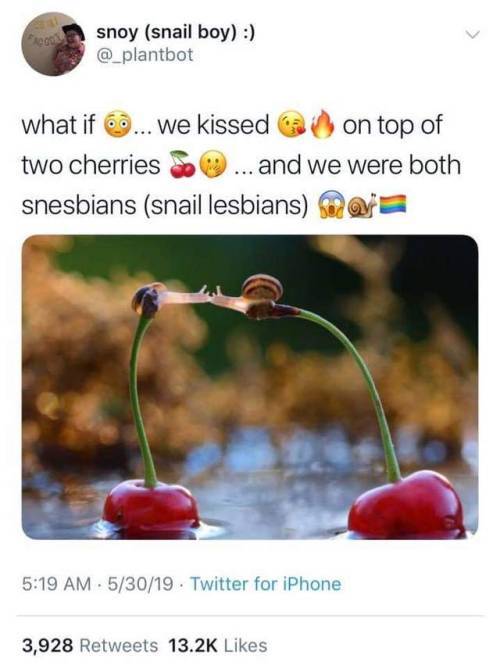
via
The thee liquids for the Pride brass player: water, sunblock, valve oil

Emma Hunsinger's How to Draw a Horse. So, so, so, good.

2019.06.09
The algorithms that show you "Up Next" aren't politically biased by design, but in practice - yow.
"There's a spectrum on YouTube between the calm section -- the Walter Cronkite, Carl Sagan part -- and Crazytown, where the extreme stuff is," said Tristan Harris, a former design ethicist at Google, YouTube's parent company. "If I'm YouTube and I want you to watch more, I'm always going to steer you toward Crazytown."The story talks about how the algorithms at first focused on proximate content (i.e. videos with similar outlooks) but when they introduced the goals of getting people to stay on longer, started selecting towards pushing people to more engrossing stuff - and folks on the alt right figured out how to leverage this pattern.
Here's the most bullshit, weak-sauce, mathematically illiterate defense I've read this week:
In interviews, YouTube officials denied that the recommendation algorithm steered users to more extreme content. The company's internal testing, they said, has found just the opposite -- that users who watch one extreme video are, on average, recommended videos that reflect more moderate viewpoints.LOL, I think they're arguing that regression to the mean somehow shows there isn't a trend. I mean come on - if someone lands on some of the most wackadoodle stuff, chances are, statistically, the recommendations will be somewhat less wackadoodle than that. Math is hard!
A slim silver lining is that the left is figuring this out as well, a "group [that] calls itself BreadTube, a reference to the left-wing anarchist Peter Kropotkin's 1892 book, 'The Conquest of Bread.'" Previously I enjoyed Contrapoints response to Jordan Peterson and the unlikelihood of the conflation of "Post-Modern Neo Marxism".
But yeah. These algorithms are god-awful. "You might also like" was sort of cool on Everything2, but it's too clear that rabbit holing can be utterly abused. (And while I'm at it, screw Netflix and autoplaying next. It's like a self-refilling glass for casual drinkers.)
An x-ray of a brown long-eared bat.
(Photo: Chris Thorn)

via
"I'll Fly Away" from the Second Line for Dr. John (spotted by Daniel in SoH)
Just so it's known - I'm no Dr. John but if I die any time soon I sure as hell want as much music as the Boston area folk I've played with this past half-decade or so can muster. Probably w/ a lot of School of Honk songs so everyone can join n.
LOL, so Marvel/Disney are being uptight about streaming rental of Captain Marvel (gotta get that new gawd forsaken DisneyPlus mojo working I guess, grrrrrrrr) - maybe it'll be time to go to frickin' Red Box physical media for a while til they get this shit settled or I succumb to the Mickey Christ and subscribe or steal a subscription.
2019.06.10
*event happens* but how does this affect Me, the Protagonist of Reality
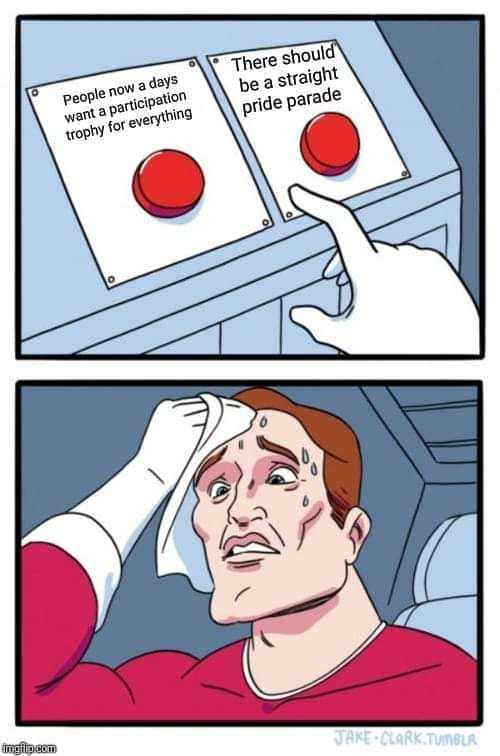
2019.06.11
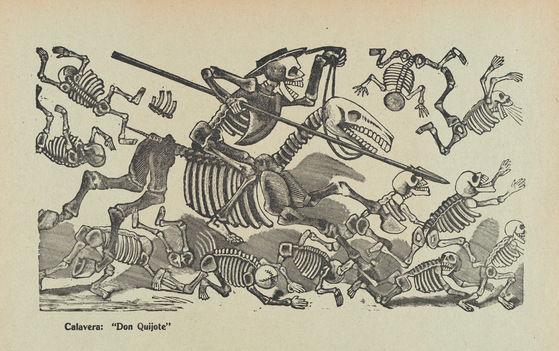
when I find myself in times of trouble mother Mary comes to me, speaking words of wisdom "log off"
I wasn't quite happy with any of the free Invoice generators out there so I hacked together my own.
So astonishing that the film The Matrix is 20 years old. Still feels fresh. Here's the best analysis of it I recall seeing:
2019.06.12
Pressley: How many extremist murders has the FBI linked to Black Lives Matter or similar black activist groups?
McGarrity: We don't work Black Lives Matter it's a movement. It's an ideology. We don't work that.
Pressley: So the answer is none. Can you just say that for the record? There has been no killing that the FBI can link to black Lives Matter or similar black activist groups, to your knowledge.
McGarrity: To my knowledge--I'd have to go back--but to my knowledge, right now, no.
2019.06.13
Things are not what they seem; nor are they otherwise.
Play all the Steely Dan albums in release order.It's not quite "consciousness", but when the automated assistant can do the right thing based on that query, we know we are doing with somewhat more clever things!
Sometimes I'm not sure if our grammar processors are as sophisticated as Infocom parsers on old text adventures. I could tell the turtle in "Enchanter" 'turtle, go se then get the scroll then go nw.' and the turtle would do that.
G is for gin! T is for tonic! Our six titties are supersonic! We don't mind men - We don't like fuss. We're the Glee team - Come and get us !
Band Life Hack - having trouble keeping your group together and tight on the descending line in a cover of Herbie Hancock's Chameleon (like around 0:55 of that one?) Try the mnemonic "HERbie / Hancock / CuriOsity is good...."
2019.06.14
From the cries of Sinn Fein to the whines of Jackie Mason, everybody's got an agenda and everyone thinks he or she is right. Trying to change someone's mind usually becomes an exercise in futility, so it is your job to pretend to care. Offer some tepid advice and move on. Cultivate the Switzerland of your soul and remain delightfully detached.That final line has been buzzing around my head lately - the usual caveats of there being some privilege in it, and that some struggles ARE worth pursuing - but you gotta pick your battles, or maybe more importantly - pick your battlefields.
ThinkGeek kinda going away...
Oh, that's kind of a bummer! They had a nicely curated bunch of geeky stuff....
People who like Hawaiian Pizza - would you also enjoy, say, a banana slathered with mayo? 'Cause to us that's the same energy, right there, more or less.
2019.06.15
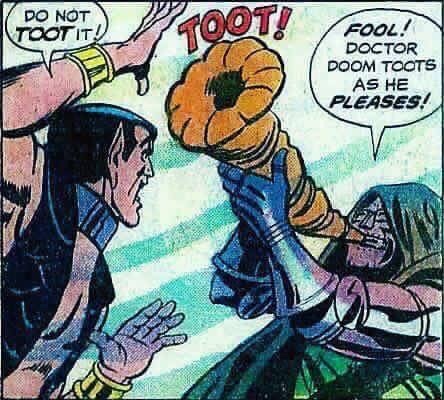
2019.06.16
Americans are so enamored of equality that they would rather be equal in slavery than unequal in freedomMy response was this:
So, this is half true in the way Tocqueville probably means, but the other half is - man, that is just basic human psychology. People would rather be the slightly richer person in their poor peer group than the poorest of a somewhat more well-off cohort. I think it's because, when everyone is poor, it feels like that is just the way the world is, you know? Everyone is in more or less the same boat, but maybe you did better or worse than your shmuck neighbors - that's where the competition is, always local. If everyone were "equal in slavery", then freedom would be largely unknown and almost unimaginable.
Personally the american level-seeking characteristic I'm more concerned with these days is smarts; some Americans are so convinced of their own truthy gut intuition that they refuse to recognize that smarts and expertise actually exists; that some problems take a lot of study and though - sometimes pursuing their own specialized glossary or vocabulary so that to the outsider, it's almost impossible to tell if it's just some weird, out of touch intellectual circle jerk or more hard won esoteric knowledge. This point is why I was rather disdainful of that Intellectual Yet Idiot post you linked to here.
My favorite image from a remarkable The Public Domain Review page, X is for - what did alphabet books do before X-Rays and Xylophones were in the zeitgeist?
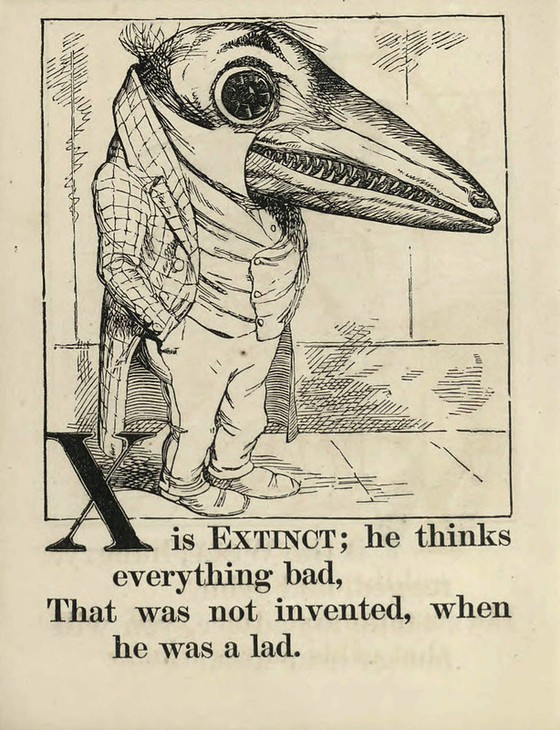
(The site has the full content of Charles H. Bennett's 1855 Beasts, birds and fishes : an alphabet for boys & girls - the n-word makes an unfortunate appearance as a music descriptor, only somewhat mitigated by isolating it in quote marks.)
2019.06.17
I was delighted they released the MP3 for this (as with other NIN covers that lighten things up, it reveals that Reznor is a crazy good tunesmith.) I also delighted in planning to subject Melissa to it in the car...
She was frustrated because she couldn't think of a good revenge song for me. And I admit it's a tough road! I like many things musically (anything that I don't find boring in terms of bass and rhythm floors) and I don't hold much sacred... even, say, a country western version of my most sacred song "Groove Is In The Heart" might be kind of fun!
"NIN" was definitely a teenage expression/rebellion piece for many folk. I guess the nearest thing I had to that was Beastie Boys "License to Ill". (I remember my mom asking if something was wrong when she saw I destroyed the tape during a bout of spiritual repentance.)
Anyway, did you have a "teen rebellion" song or album or genre? What was it?
I also loved that they released this shirt:

Anyone else seeing an extra amount of spam slipping through Gmail's filters today? (And being labeled 'important', is the goading thing for me)
2019.06.18
An early 1980s Sunday School class about the subject, including an illustration of a Christian in front of a firing squad along with other terrors to come, left me with an indelible association of Christianity with future horrors, especially if you don't act right (all the Jesus acceptance and born-again-ness) and even if you do. Which then fed into a disdain I still carry for "pre-tribs", folks who think the Christians get swept away to their eternal happiness before all the shit goes down, because God must love us too much to let that happen to US, right? (I have bitterness when pop-religion seems to sugarcoat the source material - the way a "Grampas looking down from us in Heaven right now, Timmy" view seems more grounded in consoling hopefulness than the actual scriptures - my church's 11th and final doctrine was "We believe in the immortality of the soul; in the resurrection of the body; in the general judgment at the end of the world; in the eternal happiness of the righteous; and in the endless punishment of the wicked." I realized that that view of a bodily resurrection and a judgement at the END of the things is more caught in "Man of Constant Sorrow"'s final verse ("as I lay sleeping in my grave") than most of the songs I had been singing in Sunday School... and so I'm both envious of and sometimes a little disdainful of folks who have a softer, gentler form of Christianity, even as I realize I can't be sure their view is less reliable than mine harsh one - it's certainly more pragmatic and psychologically sound, whether or not it feels like wishful thinking to me.)
A few years ago I ran into the idea of Preterism, the idea that the stuff in Revelation happened along with the destruction of the Temple in 70CE. (Heh - compare that to the tongue-in-cheek pop-culture idea that Mayans were right, time ended in 2012 and now we're just watching things fall apart.) Anyway, I wish I had a better feel for this view, I can't read the fantastical and completely apocalyptic imagery outside of the lens of a "guide to future events" that has stoked both way too much of my childhood fears and informed too much of our foreign policy in the Middle East...
Man, this ramble got longer than I expected when I found an old blog note on "Preterism". I'll leave you with a reference to APOCAMON - the first few pages are rough, implying sexual abuse of John of Patmos by Roman soldiers, but then gets into a fascinatingly literal illustration of the warring angelic and demonic forces of the final battle.
OK, finally finally, I remember this quote:
Pick up a reggae album at random. Any reggae album. Listen to it and you will find a far more accurate, reliable and theologically sound exegesis of the meaning of Babylon than you will ever get from Tim LaHaye or any other so-called 'prophecy expert.'

2019.06.19
Who made the world?
Who made the swan, and the black bear?
Who made the grasshopper?
This grasshopper, I mean-
the one who has flung herself out of the grass,
the one who is eating sugar out of my hand,
who is moving her jaws back and forth instead of up and down-
who is gazing around with her enormous and complicated eyes.
Now she lifts her pale forearms and thoroughly washes her face.
Now she snaps her wings open, and floats away.
I don't know exactly what a prayer is.
I do know how to pay attention, how to fall down
into the grass, how to kneel down in the grass,
how to be idle and blessed, how to stroll through the fields,
which is what I have been doing all day.
Tell me, what else should I have done?
Doesn't everything die at last, and too soon?
Tell me, what is it you plan to do
with your one wild and precious life?
2019.06.20
"Whatcha doin'?"I'm sort of using this line as excuse of why I'm walking in the rain to McDonalds today to try the 2 "must get" items from McDonald's Worldwide Favorites menu.
"Looking for frogs."
"How come?"
"I must obey the inscrutable exhortations of my soul."
"Ah. But of course."
"My mandate also includes weird bugs."
Bloomberg: Boston Built a New Waterfront Just in Time for the Apocalypse Sometimes Boston is so crazily haphazard in its urban planning. I feel we try to coast (no pun intended) a lot with ambient smartness from the universities but we don't actually always do a lot of thinking.
Around 20 years ago (spring of 1999) the word "blog" was coined. Odd to realize that I've been blogging - daily - for over 18 years of that.
Yeah, Burger King sounds cool and all until you say the words Hotdog Emperor
Actually, it's only existentialism if it comes from the existentialism region of France. Otherwise, it's just sparkling anxiety.
2019.06.21
It's been my experience that almost everything easy to mock turns out to be interesting if you pay closer attention.I recommend the series, it's appealing in a Nicholson Baker / Donald A. Normal kind of way, a thoughtful, medium-deep dive into mundane things.
Green's quote echoes one of my oldest theories, a "Theory of Multiple Intelligences for Objects" - that nearly everything extant is good at SOMETHING. Great things are good at many things.
Snobs can sniff at objects that are only good at things they don't find worthwhile, but still, it's either empathy-lacking arrogance or foolishness that causes the whole "if it's popular, it must suck" mentality, which goes hand in hand with Green's "easy to mock" concept.
Nothing remains, but nothing is lost...
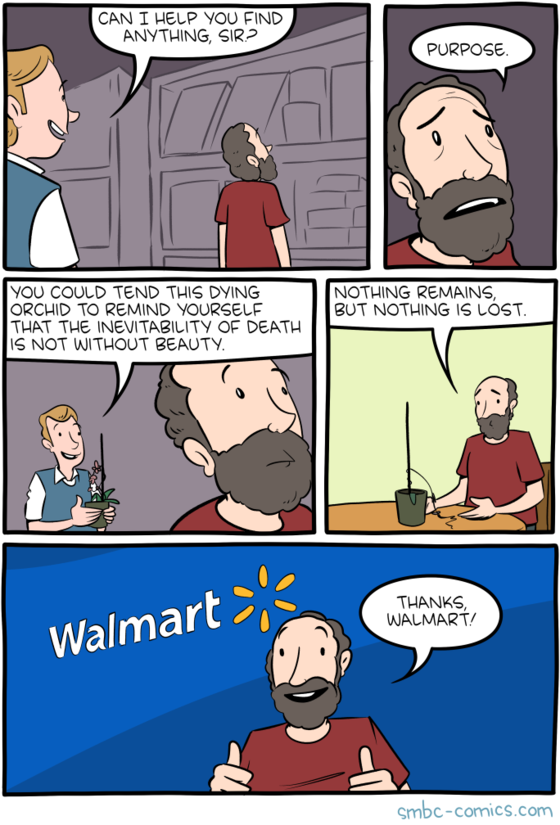
source
Taken at face value, Trump's decision to halt a strike against Iran because 150 likely deaths on the Iranian side for 1 drone wouldn't be a good balance is a small spark of light.
2019.06.22



2019.06.23
The philosopher Stephen Toulmin identified the transparency-versus-opacity contrast as the key to understanding the ancient rivalry between Greek and Babylonian sciences. According to Toulmin, the Babylonian astronomers were masters of black-box predictions, far surpassing their Greek rivals in accuracy and consistency of celestial observations. Yet science favored the creative-speculative strategy of the Greek astronomers, which was wild with metaphorical imagery: circular tubes full of fire, small holes through which celestial fire was visible as stars, and hemispherical Earth riding on turtleback. It was this wild modeling strategy, not Babylonian extrapolation, that jolted Eratosthenes (276–194 BC) to perform one of the most creative experiments in the ancient world and calculate the circumference of the Earth. Such an experiment would never have occurred to a Babylonian data fitter.
The defining characteristic of a complex system is that it constitutes its own simplest behavioral description. The simplest complete model of an organism is the organism itself.
We should all make it a regular practice to reread books from our youth, where we are apt to discover clear previews of some of our own later "discoveries" and "inventions," along with a wealth of insights to which we were bound to be impervious until our minds had been torn and tattered, exercised and enlarged, by confrontations with life's problems.
In the long run, there is no distinction between arming ourselves and arming our enemies.
In a moving passage from his 1935 novel Odd John, science fiction's singular genius Olaf Stapledon has his hero, a superhuman (mutant) intelligence, describe Homo sapiens as "the Archaeopteryx of the spirit." He says this fondly to his friend and biographer, who is a normal human. Archaeopteryx was a noble creature, and a bridge to greater ones.
A former colleague of mine, Gérard Bricogne, used to joke that carbon-based intelligence was simply a catalyst for the evolution of silicon-based intelligence.
But if we step back and look at life on Earth, we see that we are far from the most resilient species. If we're going to be taken over at some point, it will be by some of Earth's oldest life-forms, like bacteria, which can live anywhere from Antarctica to deep-sea thermal vents hotter than boiling water, or in acid environments that would melt you and me. So when people ask where we're headed, we need to put the question in a broader context. I don't know what sort of future AI will bring: whether AI will make humans subservient or obsolete or will be a useful and welcome enhancement of our abilities that will enrich our lives. But I am reasonably certain that computers will never be the overlords of bacteria.
A common test I have for U.S. citizens is this: Do you know anybody who owns a pickup truck? It's the number-one-selling vehicle in the United States, and if you don't know people like that, you're out of touch with more than 50 percent of Americans.
2019.06.24
I'm thinking too of the Eureka effect and the anecdote about Poincare having an important mathematical truth revealed to his conscious mind as he stepped onto a bus. (Zen and the Art of Motorcycle Maintenance talks about that) So just like Placebos get some parts of our brains to heal us our subconscious minds can solve difficult problems...
(At least, I think it's our brains healing us - I mean a lot of medical problems get cleared up by our bodies on their own, but I wouldn't expect the "just leave it alone" solution to get so much better over 25 years - unless we thought people were living that much more healthily, I guess?)
So the subconscious is this weird dark thing! There are so many ways of looking at it- I'm not sure if they're all talking about the same phenomenon, or if it's the same in all people, but man! I know historically my conscious, narrating brain takes credit for being "the real me" - and so much so that this subconscious self seems like an "other" - an inner child, or some wild id, or the elephant in the "elephant and the rider" metaphor - and maybe it has to do with lobes, at least sometimes? That it's our non-verbal lobe... Split-brain studies are so wild - our physical brains have the capacity to be two almost completely functional people! What is going with that? And how can we best leverage the situation?
More and more my other self feels less like an inner child and more like a loyal and clever but poorly trained dog... in particular a dog always on the lookout for snacks, at least when I'm in the kitchen at work... the emotional tricks this pup plays to get treats that the analytical brain knows I could easily do without. (heh, googling I find some signs of therapy that looks to inner dogs instead of inner children )
So step one was realizing my "inner voice", the part that talks and can use language, wasn't quite the same as "me". And the obvious answer to that was to think of myself holistically - either as one thing with two sides, or at least as two subentities, co-equal in authenticity and dignity.
But maybe that was a mistake? Maybe step two should be leaning into my rational self as the realest me? Trying to think through the implications of that - I (my narrative self, that is) is forever adverse to taking authority - I don't want to enforce my judgements over others because I might be wrong, and it's deeply important to me to be in line with the "objectively true" universe (at least one ex realized this would mean I'd be a good buddy-dad but maybe not a great father, and I think they had a point.) But maybe this is one of those cases where the speaking, rational self needs to step up, and take authority.
But - if the unconscious me is almost a separate entity, and I treat it as such, I worry about the effects of it coming to resent the conscious me! It's tough to confirm the trust and loyalty of my inner-pup, it lacks the tail-wagging body language of real dogs....
Damn.
You know, all my life I've lived with cats, and I like 'em, but that lifestyle was chosen for me, not by me. Sometimes I think it would have been good for me to have grown up with dogs a bit more. I'm not sure which is closer to my spirit-animal; I mean I really see something of my need for space to pursue my own projects in cats aloofness, but also I think I have that goofy loyalty and need for feedback I associate with dogs. (yes, I know cat owners can point out the cuddly loyalty of cats, but I'm speaking in broad stereotypes here.)
Thinking more about the idea that it would be a big mistake to label the unconscious / subconscious as a single thing - I just remembered the single part of my unconscious mind that has most allowed me to punch above my weight, intellect-wise - my "get the gist", skimming subsystems, the ones that allow my eyes to merely dart over a paragraph and do a pretty damn reliable job telling me what's important in there, summarizing the feel of the interactions and directing me to go back to bits that didn't quite register. (And of course the partner subconscious systems that apparently piggyback on my vocalization systems to type -- thus all the horrible spelling (especially for vowels) and the strange typos like "by" for "my").
I have to assume these systems are distinct from the part of my brain that drive me to the chocolate covered pretzels in the kitchen at work. But it's so dark in that skull it's hard to be certain...
Modern web development pic.twitter.com/p84IVkC2aQ
— Jared Palmer (@jaredpalmer) June 23, 2019
An even better version
When life gives you hurdles, trip over those hurdles. Let your legs become tangled in a series of hurdles that you drag behind you. Crawl with your giant collection of hurdles towards more distant hurdles
2019.06.25
I really like this approach to Theodicy (why God permits evil):
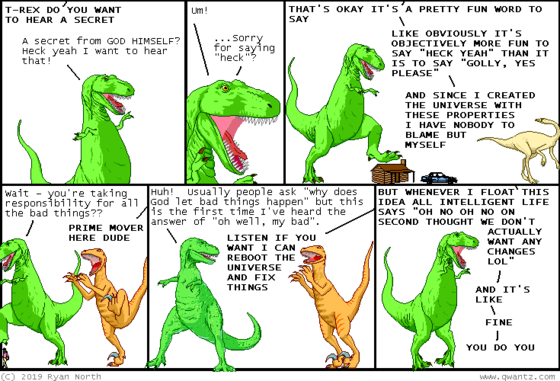
via
2019.06.26
Here is one of my favorite b-boy/breakdance bits from way back when:
2019.06.27
We desperately need non-partisan groups to draw up districts. It should be bleedin' obvious that we should not have politicians setting the bounds for their own elections.
Johnny Cash, you're just like a thorn tree in a whirlwind.
Wow, Jony Ive is out at Apple I agree with Gruber that, that while Ive has a singular vision, to the extent that he was responsible for thinner at all costs including this keyboard mess, it's good to move past that. The other thing is how I never would have guessed that the "we will still partner together" spin is such empty horseshit, if Gruber's analysis is right.
nice seeing fireworks from your third floor window!


2019.06.28
- Age 1
- “The Very Hungry Caterpillar” by Eric Carle
- Age 2
- “Llama Llama Red Pajama” by Anna Dewdney
- Age 3
- “Where the Wild Things Are” by Maurice Sendak
- Age 4
- “Charlie Parker Played Be Bop” by Chris Raschka
- Age 5
- “The Giving Tree” by Shel Silverstein
- Age 6
- “Ramona the Pest” by Beverly Cleary, illustrated by Jacqueline Rogers
- Age 7
- “The Complete Calvin and Hobbes” by Bill Watterson
- Age 8
- “Harry Potter and the Sorcerer’s Stone” by J.K. Rowling
- Age 9
- “Tales of a Fourth Grade Nothing” by Judy Blume
- Age 10
- “Smile” by Raina Telgemeier
- Age 11
- “Ghost” by Jason Reynolds
- Age 12
- “Roll of Thunder, Hear My Cry” by Mildred D. Taylor
- Age 13
- “I Am Malala” by Malala Yousafzai
- Age 14
- “The Perks of Being a Wallflower” by Stephen Chbosky
- Age 15
- “The Hate U Give” by Angie Thomas
- Age 16
- “Jane Eyre” by Charlotte Brontë
- Age 17
- “Once Upon a River” by Bonnie Jo Campbell
- Age 18
- “A Gate at the Stairs” by Lorrie Moore
- Age 19
- “The Handmaid’s Tale” by Margaret Atwood
- Age 20
- “The Brief Wondrous Life of Oscar Wao” by Junot Díaz
- Age 21
- “The Sun Also Rises” by Ernest Hemingway
- Age 22
- “Democracy in America” by Alexis de Tocqueville
- Age 23
- “The Autobiography of Malcolm X” by Malcolm X and Alex Haley
- Age 24
- “Atlas Shrugged” by Ayn Rand
- Age 25
- “I Capture the Castle” by Dodie Smith
- Age 26
- “Americanah” by Chimamanda Ngozi Adichie
- Age 27
- “The 7 Habits of Highly Effective People” by Stephen R. Covey
- Age 28
- “Sister Outsider” by Audre Lorde
- Age 29
- “In Defense of Food” by Michael Pollan
- Age 30
- “The Joy of Sex” by Alex Comfort
- Age 31
- “Mastering the Art of French Cooking” by Julia Child, Louisette Bertholle and Simone Beck
- Age 32
- “The Grapes of Wrath” by John Steinbeck
- Age 33
- “Becoming a Man: Half a Life Story” by Paul Monette
- Age 34
- “Beloved” by Toni Morrison
- Age 35
- “How to Talk So Kids Will Listen & Listen So Kids Will Talk” by Adele Faber and Elaine Mazlish
- Age 36
- “Life Among the Savages” by Shirley Jackson
- Age 37
- “The Joy Luck Club” by Amy Tan
- Age 38
- “The Sportswriter” Richard Ford
- Age 39
- “What Alice Forgot” by Liane Moriarty
- Age 40
- “The Diving Bell and the Butterfly” by Jean-Dominique Bauby
- Age 41
- “Rabbit, Run” by John Updike
- Age 42
- “The Woman Upstairs” by Claire Messud
- Age 43
- “Their Eyes Were Watching God” by Zora Neale Hurston
- Age 44
- “The Goldfinch” by Donna Tartt
- Age 45
- “Where’d You Go, Bernadette” by Maria Semple
- Age 46
- “Salvage the Bones” by Jesmyn Ward
- Age 47
- “Stretching” by Bob Anderson
- Age 48
- “Bossypants” by Tina Fey
- Age 49
- “Walden” by Henry David Thoreau
- Age 50
- “Fifty Shades of Grey” by EL James
- Age 51
- “Who Do You Think You Are?” by Alice Munro
- Age 52
- “Men Without Women” by Haruki Murakami
- Age 53
- “A Man Called Ove” by Fredrik Backman
- Age 54
- “The Denial of Death” by Ernest Becker
- Age 55
- “Olive Kitteridge” by Elizabeth Strout
- Age 56
- “When Things Fall Apart” by Pema Chödrön
- Age 57
- “Remains of the Day” by Kazuo Ishiguro
- Age 58
- “The Plague of Doves” by Louise Erdrich
- Age 59
- “Dynamic Aging” by Katy Bowman
- Age 60
- “The Five Years Before You Retire” by Emily Guy Birken
- Age 61
- “Fear of Dying” by Erica Jong
- Age 62
- “Major Pettigrew’s Last Stand” by Helen Simonson
- Age 63
- “Our Souls at Night” by Kent Haruf
- Age 64
- “Old in Art School” by Nell Painter
- Age 65
- “65 Things to Do When You Retire” edited by Mark Evan Chimsky
- Age 66
- The “Outlander” series by Diana Gabaldon
- Age 67
- “Don Quixote” by Miguel de Cervantes
- Age 68
- “The Year of Magical Thinking” by Joan Didion
- Age 69
- “I Remember Nothing” by Nora Ephron
- Age 70
- “Master Class: Living Longer, Stronger, and Happier” by Peter Spiers
- Age 71
- “Midnight’s Children” by Salman Rushdie
- Age 72
- “Love in the Time of Cholera” by Gabriel García Márquez
- Age 73
- “The Years of Lyndon Johnson” four volumes, by Robert Caro
- Age 74
- “Paris in the Present Tense” by Mark Helprin
- Age 75
- “The History of Love” by Nicole Krauss
- Age 76
- “Women Rowing North” by Mary Pipher
- Age 77
- “Gilead” by Marilynne Robinson
- Age 78
- “Charlotte’s Web” by E.B. White
- Age 79
- “The Coming of Age” by Simone de Beauvoir
- Age 80
- “Coming Into Eighty: Poems” by May Sarton
- Age 81
- “Devotions” by Mary Oliver
- Age 82
- “The Summer of a Dormouse” by John Mortimer
- Age 83
- All the thrillers and mysteries
- Age 84
- “The Last Unknowns” edited by John Brockman
- Age 85
- “Ravelstein” by Saul Bellow
- Age 86
- “Old Filth” by Jane Gardam
- Age 87
- “King Lear” by William Shakespeare
- Age 88
- “Nearing Ninety: And Other Comedies of Late Life” by Judith Viorst, illustrated by Laura Gibson
- Age 89
- “A Carnival of Losses: Notes Nearing 90” by Donald Hall
- Age 90
- “Beachcombing for a Shipwrecked God” by Joe Coomer
- Age 91
- “Selected Poems: 1988-2013” by Seamus Heaney
- Age 92
- “Nothing to be Frightened Of” by Julian Barnes
- Age 93
- “Sapiens” by Yuval Harari
- Age 94
- “This Chair Rocks: A Manifesto Against Ageism” by Ashton Applewhite
- Age 95
- The Neapolitan novels by Elena Ferrante
- Age 96
- “Somewhere Towards the End” by Diana Athill
- Age 97
- “My Own Two Feet” by Beverly Cleary
- Age 98
- “Life Is So Good” by George Dawson and Richard Glaubman
- Age 99
- “Little Boy” by Lawrence Ferlinghetti
- Age 100
- “Sailor and Fiddler: Reflections of a 100-Year-Old Author” by Herman Wouk
Live Action References for Disney's Little Mermaid:
Phew- watching the show "Abandoned", episode on Ghost Malls, starting with Randall Park mall.... sigh. (though it's like they got their a bit late after demolition was underway so not many interior shots)
and now euclid square mall, dang. though that felt a bit less vibrant even back in 1990.
weird show. skaters, store front churches, and paranormal investigators.
I knew there was a lot to respect in Sikh culture, but was unaware of their increasing presence in the trucking industry.
2019.06.29



2019.06.30
How long is a piece of string?British idiom I hadn't heard of, but like immensely. It reminds me a bit of my Nana's answer to her daughters' incessant "Why?"s - "Why is a cow?"
This "outlandish" (a good Anglo-Saxon word for 'foreign') vocabularyI do love when a word's origins are revealed to have been hiding in plain site - I had never thought of "outlandish" as out-land-ish! Or like how a "secretary" keeps secrets...
It's a game of inches: 'progress towards a goal comes in small increments'This was the one entry from a list of explicated sport metaphors where I wasn't sure I agreed - progress in American football is often made in great bounds, exciting, yard-consuming catches and runs - but the final result is then measured painstakingly, and the difference in success and failure can be a heartbreakingly small amount.
English isn't arithmetic , but many people want it to have clear rules like 2 + 2 = 4 . Rules themselves are not a problem. The problems come when so - called grammar fans conclude that if one rule is right , then anything else is illogical. That's just not a logical way of thinking . It's like saying that if 1 + 4 = 5 , then 1 + 1 + 3 cannot also equal 5. Nevertheless if there are two ways to spell a word or construct a sentence, then people will conclude that one way must be the better way [...] So if someone tells you that a word cannot mean X because it already means Y or that we should all stop saying Z because it is logically inconsistent, just say to yourself: here is a person who doesn't have a very good sense of how English works. If you want to entertain yourself, you can point out the inconsistencies of their argument. If you want an easy life, you can just ignore them--up to a point. If you see that person spinning their illogical yarns in front of a classroom or a government education department, you have a moral duty to step in.(Actually these two paragraphs are 30 pages apart.)
For Wagner, as for most speakers of British English, a frown is an expression of displeasure that involves contracting the brow. But for me, and many speakers of American English, frowning involves turning down the corners of the mouth to indicate unhappiness, and more particularly sadness. That meaning is a 20th-century invention, and most American dictionaries have not yet noticed it. Some (mostly older) Americans still have the 'brow'-only meaning. But the new meaning is widespread, and more American than British, as our emoji names show. The ☹ is most commonly called sadface in British English, whereas it's frown or frowny face in many American contexts--including the standards document for Unicode, the international (but Americentric) body that approves new computer symbols.I remember discovering the "frown = brows" thing playing Pictionary (in English) with some German friends...
A wise American reporter based in London once told me that every British news story is, deep down, about class. Every American story, he said, is about race.
A 1642 Massachusetts law saw illiteracy as child abuse. Parents could lose custody of their children if they were not taught to read. By the end of that century, most of the northern colonies had similar laws. By 1800 the United States had the highest literacy rate in the world. "Nearly every child, even those of beggars and blacks in considerable numbers, can read, write, and keep accounts," reported the president of Yale College in 1823. This was less true in the South, where several colonies, starting in the mid-1700s, had made it a crime to teach slaves to write. But until the decades just before the Civil War, it was no crime to teach enslaved people to read. Writing could be a tool for rebellion, but reading was a spiritual necessity.I wasn't aware or had forgotten that you can read without knowing how to write. I wonder if that's like being able to understand a foreign language a bit, but not speak it well.
Murphy also talks about diagramming sentences - a pursuit much more popular in the USA, according to Murphy. You would think a literate and lego-loving nerd like me would love diagramming sentences, but I hated it. I remember writing bitter complaints about how having to crucify these poor sentences. In hindsight, I guess it felt like I was just painstakingly giving arbitrary symbols to things without gaining new insight into how the parts interacted...
I found an old blog post mentioning "Too Close for Comfort", a sitcom name I was trying to remember. "Too Close for Comfort" is a kind of early prototypical early-80s sitcom that I don't think many people remember very well, a post-Mary Tyler Show vehicle for Ted Knight. I mostly remember a character (probably his) was talking about his comic character "Cosmic Cow" and how the secret was being able to draw an inoffensive udder... I think about that whenever I see a cartoon cow, especially one walking upright.
